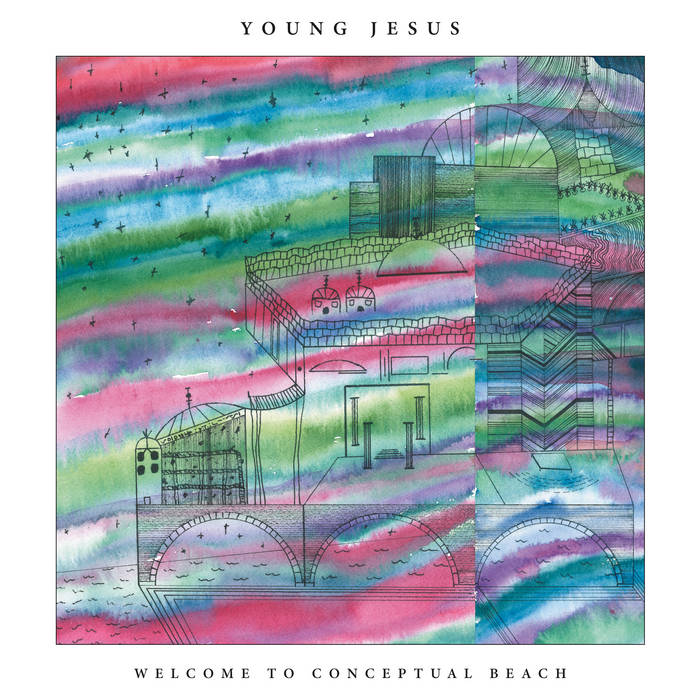Album Review: Young Jesus — Welcome to Conceptual Beach
Posted: by The Alt Editing Staff

Sometimes listening to Young Jesus, the elastic rock group from LA, can be a little intimidating. Their previous two records S/T and The Whole Thing is Just There engage with some heady concepts—big, ambitious ideas about the meaning of feeling, time, existence, nature, stretched out and explored in exploratory and sometimes improvisational indie rock aesthetics that absorb techniques from jazz and jam bands in equal measure. And writing about this band is also a tricky task; some of my past attempts to do so have left me a little turned around, their music so adept at diving down philosophical rabbit holes that manifest themselves with a rare power in their ever-shapeshifting and tenderly wrought songs. When I spoke to frontman John Rossiter a few years back around the release of The Whole Thing is Just There, I remarked that our conversation felt like “diving into an ocean of ideas.” The same can be said for Young Jesus’s music.
With their new record, Welcome to Conceptual Beach, none of that has really changed, but the results feel somewhat different. S/T and The Whole Thing both expanded and refined Young Jesus’s core touchstones, but they still felt like they rested firmly in the landscape of emo-adjacent indie rock, their Saddle Creek home making perfect sense with their raw, spindly recordings. But on Welcome to Conceptual Beach, the band has transformed into something a little cleaner, a little more precise, and, most of all, they’ve grown into a band that seems to be wholly in a league of their own.
A gentle groove and Rossiter’s ruminative, vocoder-manipulated vocals open Welcome to Conceptual Beach, easing us patiently into the 7-minute “Faith,” a song that will eventually build into a sprawling, horizon-gazing opus in its own right. The mumbling, staccato opening blooms into an organ-soaked climax as Rossiter’s vocals shed their gleaming adornment and the stretched-out song reaches a boiling point. “We just might grow,” Rossiter moans over and over again, the sentiment echoed in the song’s surprising expansion of the band’s sonic palette.
The other long compositions on Welcome to Conceptual Beach—particularly the 10-minute-plus closing duo in “Lark” and “Magicians”—continue along the band’s three-album tradition of using a larger canvas to display their improvisational chops, examine the power of repetition, and explore the fringes of their sound. These longer pieces—like “Gulf” on The Whole Thing is Just There or “Feeling” on S/T—are so fascinating because they often sound like the band is collectively searching for some kind of truth in their songs, and at the end of their long journey it feels as if they’ve earned some understanding. “Lark” starts off in the realm of Radiohead and trails off into a bright jam-band pastiche before basically falling apart altogether. It all comes full-circle in the final three minutes, returning to a looped riff that calls back to some of the earlier, more closely emo-adjacent work that first caught my attention on 2015’s Grow/Decompose. “Lark” is a stunning piece of work that seems to lay out a whole sonic history of a band that has come so far in the last five years.
While it’s tempting to gravitate toward these longer tracks, I still believe that the band’s growth pays the most dividends in their more condensed work. The three shorter songs on Welcome to Conceptual Beach—”Pattern Doubt,” “(un)knowing,” and “Root and Crown”—display an artistry and a restraint that help propel them to the top of the band’s catalogue. The churning and twinkling “(un)knowing” feels shockingly unguarded as it grapples with a kind of meaningful tautology (“Knowing’s led to what I know/ It comes and then it goes/ unknowing’s what I’ve grown”) that should leave my head spinning but invokes peace instead. “Pattern Doubt” and “Root and Crown” exist on opposite ends of the spectrum, the former adopting a bright splash of colorful saxophone and glittering keys and the latter stripping their sound back to its barest form, Rossiter howling against a slightly askew acoustic guitar line.
“Root and Crown” gets into metatextual territory as Rossiter proclaims “every record needs a thesis, needs a crisis, or campaign,” going on to consider whether the reasons behind why we live the way we do matter as much as the living itself—”I am not a living crisis but I’m learning how to breathe/ how to feel and how to tell my friends and family what I need,” he sings in the track’s achingly beautiful final verse. The simplest-sounding song on Welcome to Conceptual Beach, it’s “Root and Crown” that most succinctly displays the greatness of Young Jesus. These shorter songs are the ones I find myself returning to over and over as I ponder over the ways that this band has come to define itself in majestically probing their ocean of ideas, a practice they have most fearlessly undertaken on Welcome to Conceptual Beach.
Disappointing/Average/Good/Great/Phenomenal
–
Jordan Walsh | @jordalsh
The Alternative is ad-free and 100% supported by our readers. If you’d like to help us produce more content and promote more great new music, please consider donating to our Patreon page, which also allows you to receive sweet perks like free albums and The Alternative merch.










